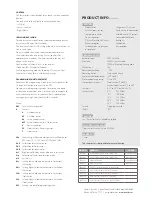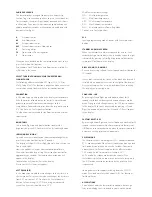
CHOICE OF SENSOR
The thermostat has a range of choices when it comes to
sensors. To get to the menu you have to press Center (confirm)
for 10 seconds, then press Right (down) once and an A shows
in the display. Then press Center (confirm) again and you can
choose one of these modes, while moving up and down with
buttons Left or Right.
A
Air/room sensor
AF
Air+Floor sensor
A2
External room sensor
A2F
External room Floor sensor
P
Power regulator
FP
Floor Power regulator
F
Floor sensor
When you have decided on the sensor mode you want to use,
press Center (confirm) button.
If you choose F or AF and there is no floor sensor installed, Err
will display in the screen.
SELECT THE RIGHT OHM VALUE FOR YOUR EXTERNAL/
FLOOR SENSOR
The following values are available: NTC type (10, 12, 15, 33 or
47kΩ). Default 10kΩ. The function is only active when an external
sensor is connected. Confirm with Center (confirm) button.
CALIBRATION
In this mode you are able to adjust the displayed temperature.
If the thermostat of some reason (or sensor) is not calibrated
properly you are able to make minor changes to the
temperature. You are able to raise/lower the set point by up to
4°C. Confirm with Center (confirm) button.
This function is only available for the floor sensor and external
room sensor.
BRIGHTNESS
Use Left and Right (up and down) button to adjust the
brightness between 0-9. Confirm with Center (confirm) button.
INCLUSION/EXCLUSION
To include the thermostat to your home automation gateway,
press Center (confirm) button for 10 seconds.
The display will show OFF. Press Right (down) 4 times till you see
Con in the display.
Now start add device in your home automation software.
Start inclusion mode by pressing Center (confirm) button for
approximately 2 seconds. The inclusion/exclusion icon will
appear in the display.
Confirmation will show Inc/EcL in the display.
If inclusion fails, Err (error) will appear.
HYSTERESIS (DIF)
In this mode you are able to make changes to the hysteresis in
the thermostat. This means that you can changes the hysteresis
from 0.2°C up to max 3.0°C. Confirm with Center (confirm)
button. Default setting is 0.5°C. When using a waterbased
system the hysteresis should be min 1.0°C.
Min/Max temperature settings
FLO – Min Floor temperature
FHI – Max Floor temperature
ALO – Min Air/room temperature
AHI – Max Air/room temperature
PLO – Min temperature in Power Reg Mode
Confirm with Center (confirm).
ESC
Leaving programming mode. Confirm with Center (confirm)
button.
STANDBY AND MAIN SCREEN
When the thermostat remains untouched for a while, it will
automatically go to standby screen. In standby screen the light
is dimmed. By pressing Left or Right (up or down) button the
set point will be shown in the display.
DISPLAY ON/OFF - DON/DOF
Activate by pressing Left and Center (up and confirm) button for
10 seconds.
In case doF is activated, the screen will be blank (can be used if
installed where people are sensitive to the light of the display).
A very nice feature when used in a bedroom. When touching
the display, the screen lights up.
CHILDLOCK - LOC
By pressing Left and Right (up and down) buttons for 10
seconds, child lock will be activated and no changes can be
made. Trying to make changes causes the LOC text to appear
in the display. Child lock is deactivated by pressing Left and
Right (up and down) buttons for 10 seconds. OPn will appear
in the display.
FACTORY RESET - RES
By pressing buttons Right and Center (down and confirm) for 20
seconds, the thermostat will perform a complete factory reset.
NB! Please use this procedure only when the primary controller/
gateway is missing or otherwise inoperable.
CO/ECO MODE
The thermostat has 2 main programs, CO – comfort mode and
ECO - economy mode. When Center (confirm) button is pushed
for 2 seconds you switch between the 2 modes. You would
normally have 2 different set-points for the different modes.
CO – mode: Is used for normal use. Example: 22°C.
ECO – mode: Is a setback mode that you can use if the
thermostat is installed in a room or a house that is rarely used.
The ECO-mode can also be activated by the pilot wire if this
is connected.
Some gateways also support switching between CO/ECO
mode. We would normally think about CO/ECO as functions
for Home/Away.
ASSOCIATIONS
Association enables the thermostat to control a device e.g a
relay or a wallplug, that is included in your z-wave network.






















